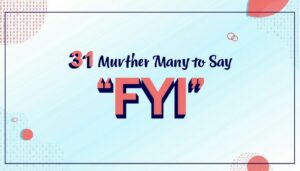We all know how easy it is to fall into the routine of saying, “Have a great rest of your week,” but sometimes, you may want to mix things up a bit.
Whether you’re communicating with colleagues, friends, or clients, a fresh way to wish someone a good remainder of their week can leave a lasting impression.
In this article, we’ll explore 12 alternative phrases that can elevate your communication and make your well-wishes more memorable, whether you’re writing an email or having a casual chat.
Enjoy the rest of your week
Meaning and Context: This phrase is friendly and straightforward, perfect for informal conversations with friends or colleagues.
Example: “Enjoy the rest of your week, and I look forward to catching up tomorrow!”
Impact: It conveys warmth and positivity, suggesting that the person’s remaining week will be enjoyable and stress-free.
Wishing you a smooth remainder of the week
Meaning and Context: This is a more thoughtful, professional variation, suitable for work emails or client correspondence.
Example: “I hope you’re able to wrap up your projects with ease. Wishing you a smooth remainder of the week!”
Impact: It conveys empathy and support, ideal when you know someone might be going through a busy or challenging period.
Hope the rest of your week goes as planned
Meaning and Context: Perfect for a positive, slightly casual setting. This is especially good when you know someone has a hectic schedule.
Example: “It was great meeting with you today. Hope the rest of your week goes as planned!”
Impact: This phrase combines well-wishing with a little touch of encouragement, particularly helpful when someone has goals or deadlines.
Take care and enjoy the week ahead
Meaning and Context: This is a forward-looking, friendly phrase that can be used in both personal and professional contexts.
Example: “I hope your project goes smoothly. Take care and enjoy the week ahead!”
Impact: It’s uplifting and optimistic, giving the impression that you’re genuinely concerned about the other person’s well-being and success.
Make the most of the rest of your week
Meaning and Context: This phrase is energetic and motivational, making it ideal for situations where you want to inspire or encourage someone to stay productive.
Example: “You’ve got this! Make the most of the rest of your week!”
Impact: It’s empowering, making the person feel like they can take on whatever the week throws their way.
Wishing you a productive and fulfilling end to the week
Meaning and Context: A more formal expression, ideal for business emails or when interacting with clients.
Example: “I look forward to our next meeting. Wishing you a productive and fulfilling end to the week!”
Impact: It’s a supportive and encouraging phrase that emphasizes both productivity and personal fulfillment.
Here’s to a strong finish to your week
Meaning and Context: Casual but still motivational. This can work in any scenario, whether with friends or colleagues.
Example: “Let’s crush the last tasks before the weekend! Here’s to a strong finish to your week!”
Impact: It boosts morale and encourages perseverance, signaling that you believe they can finish strong.
I hope your week ends on a high note
Meaning and Context: A friendly and optimistic phrase, great for any situation.
Example: “You’ve made great progress.
I hope your week ends on a high note!”
Impact: This phrase conveys a sense of optimism, encouraging the person to finish the week with positivity and success.
Wishing you a wonderful conclusion to the week
Meaning and Context: This is a more formal and polite way to express well-wishes, perfect for professional emails.
Example: “It was a pleasure working with you today. Wishing you a wonderful conclusion to the week!”
Impact: This phrase is polite and polished, offering both warmth and professionalism.
Hope the last few days of your week are just as great as the first
Meaning and Context: Casual and fun, this is ideal when you want to express positivity in informal conversations with friends or colleagues.
Example: “Your week has been going so well hope the last few days are just as great as the first!”
Impact: It’s optimistic and shows a genuine interest in the person’s well-being, while also being light-hearted.
Wishing you peace and success in the days ahead
Meaning and Context: This phrase has a more reflective, thoughtful tone, suitable for both personal and professional contexts when you want to express deeper well-wishing.
Example: “Good luck on your presentation.
Wishing you peace and success in the days ahead!”
Impact: It conveys a sense of care and good intentions, focusing on both mental well-being and success.
Have a great rest of the week
“Have a great rest of the week” is a simple, positive phrase used to wish someone well for the remaining days of the week. It conveys encouragement and good intentions, often said at the end of a conversation or meeting.
This phrase can be used in both casual and professional settings, making it versatile and widely applicable. It’s an uplifting way to leave someone with a positive sentiment, helping to foster a friendly and supportive environment.
Hope you have an easy and enjoyable end to your week
Meaning and Context: Ideal for when you want to wish someone a less stressful and more pleasant end to their week.
Example: “I hope you find time to relax. Hope you have an easy and enjoyable end to your week!”
Impact: It’s comforting, reassuring the person that their week should wind down on a peaceful note.
Conclusion
As you can see, there are numerous ways to wish someone a great remainder of the week, each offering a slightly different tone or emphasis.
From casual expressions to more professional phrasing, these alternatives allow you to tailor your message to any situation or audience.
Experiment with these phrases in your daily interactions, and you’ll likely notice that your well-wishes have a more meaningful impact. Whether you’re aiming to inspire, motivate, or simply show kindness, the right words can make a significant difference.
So, go ahead and choose the phrase that best fits your situation and watch as your communication becomes even more thoughtful and engaging!

Mark Tony is a grammar expert with 5 years of experience, specializing in teaching English grammar, enhancing writing, reading, and speaking skills for diverse learners.









